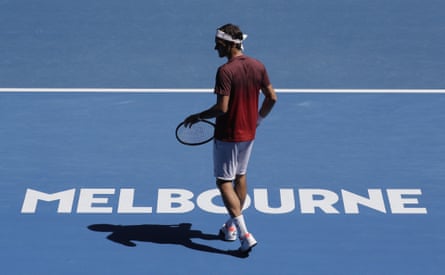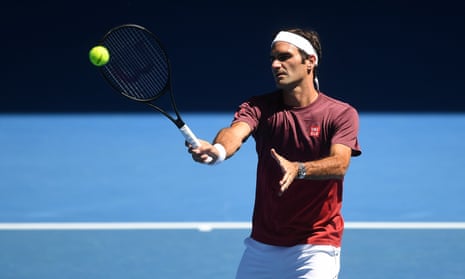Roger Federer, who is ageing with the irresistible longevity of an oak tree, is the very antithesis of Andy Murray. While the Scot’s 31-year-old body screams at him every morning when he puts on his socks and shoes, and whose match against Roberto Bautista Agut in the first round of the Australian Open might round out his career, Federer, at 37, continues to float on his own cloud.
His younger contemporaries are suffering to the point of resignation in the struggle to stay in a sport that has become cruelly brutal, yet Federer appears to be what Alex Corretja described Murray as when coaching him at his physical peak between 2008 and 2011: “indestructible.”
The Swiss has had his aches and pains – even late-career knee surgery – but, as he sets about chasing a seventh Australian Open championship and the 100th title of a career that began last century, astonishingly he is among the fittest of the 128 contenders.
There has only ever been one player named Federer in tennis, just as there was only one Bradman in cricket. The Don was plagued by ill-health, though. Federer has been blessed in every way.
“His body took the decision, unfortunately,” Federer said. “I remember when I played with him in Glasgow [in late 2017, as Murray contemplated a comeback], I couldn’t believe he actually played. But it was for a good cause. It must have been a very long couple of years for him. I was disappointed and sad, a little bit shocked, to know now that we’re going to lose him at some point. I hope that he can play a good Australian Open and can keep playing beyond that, finish the way he wants to at Wimbledon.”
Those are noble sentiments. The reality is Murray is near breaking point. Only more surgery could prolong his career. There is no defying the calendar.
Largely immune to the ravages of time himself, the defending champion – who plays Denis Istomin on Monday evening - described on Sunday how players slowly crumble as the years pass.
“Let’s say when you’re young, you have, I don’t know, a pain in the elbow. Next day you can play with it; two days later it’s like you never had it. All of a sudden – at maybe 30, 35, 40, depending on who you are, what problems you’ve had – you will feel it for two weeks. You can still play, but now you’re playing with pain. It takes longer to get rid of.
“Everybody is very different. Everybody takes the pain differently. That’s also where you have to be very wise [about] what kind of schedule you’re playing with, what problem you’re dealing with.”
So, how has the Methuselah of sport held the demons at bay for so long?

“If you look at how unlucky things were with the incident here a few years ago when I ran the bath, I guess the knee was ready to go. Could easily have happened in the match against Novak [Djokovic], but it didn’t, maybe because I was warmed up. I have no idea what happened. You also need a bit of luck.
“Then, I understand my body very well. I know when something hurts and I can play with it; I know when something hurts and I should not play with it, but I can still play maybe a match, maybe a week, a month, whatever. Sometimes that helps. But every player has that. My team know when to push me, when they are happy that I don’t practise so much.”
The core difference between Federer and his rivals is his unshakeable belief in his talent, to trust his genius.
“I’ve always believed I can play tennis when I don’t train so much,” he said. “That’s been maybe one thing, the confidence I have in my game, even if I don’t play so much, where I still feel I can come up to a good level. Maybe that takes away some pressure.”
He added – confirming the silent thoughts of everyone in the room – that, “maybe it’s also the way I play tennis, smoother than the other guys. It maybe looks that way [but] I work extremely hard in the matches as well. It just doesn’t come across so much.”
Now he has to deliver again to launch another assault on history. In the last match of day one on Rod Laver Arena, where he has celebrated most of his 94 wins here in 107 matches stretching back to the turn of the millennium, he plays Istomin for the seventh time. The world No99 has taken just two sets off him, both in front of Federer’s Swiss friends in Basel, in their last two meetings.
Two years ago, though, he put an ailing Novak Djokovic out in five sets in the first round, his only success against the Serb in six attempts.
Federer says, “I know what Denis did to Novak. I watched the entire game. I’ve had some tough ones against him in the past. He can play well on fast courts, and that’s what it’s going to be here as well. But I’m playing good tennis. I’m confident it needs a good performance by my opponent to beat me.”

Comments (…)
Sign in or create your Guardian account to join the discussion